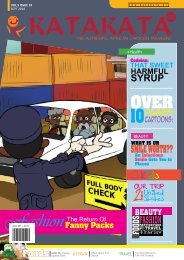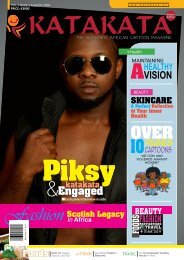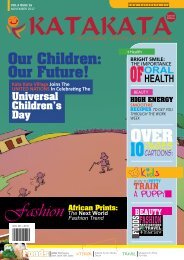2019 Edition vol6 Issue 22 DIGITAL
- No tags were found...
You also want an ePaper? Increase the reach of your titles
YUMPU automatically turns print PDFs into web optimized ePapers that Google loves.
Literature
Tribute To A Rare Literary Icon
Gabriel
Okara
POET
NOVELIST
Written by Ogo Ubabukoh
Gabriel Okara
( 1921 - 2019)
Gabriel Okara, who
died on 25 March 2019,
needs no introduction
in the literary world. A
renowned Nigerian
poet and novelist whose
literary works have been
translated into several
languages, Gabriel
Imomotimi Gbaingbain
Okara was born in
1921 in the Niger
Delta region located in
the Southern part of
Nigeria.
www.katakata.org
Okara attended the
prestigious Government
College Umuahia, where
other Nigerian prolific literary wizards
like Chinua Achebe, Christopher
Okigbo, Elechi Amadi,
Chukwuemeka Ike and Chike
Momah started their literary journey.
After his education in Umuahia, he
went to Yaba Higher College and
Northwestern University (USA),
where he studied journalism.
Often called “the Nigerian
Negritudist,” Okara’s literary works,
especially poems, clearly show deep
consciousness and value of black or
African culture and identity, through
a careful infusion of African social
realities, religion, thought, folklore
and imagery. Gabriel Okara started
his literary work after working as a
printer and bookbinder from 1945,
for the pre-independence Nigerian
government owed publishing
company. Conscious of his local
language, and an attempt not to
impose English on the local language,
Okara tried to translate his literary
works from his native Ijaw language
into English. By so doing, Okara’s
works carefully exhibit the African
culture and identity, as well as, indeed
disclose their importance. More than
that, most of his work discusses the
cultural conflicts facing Africans and
their cultures, as they live side by side
with Western culture and influence.
This thematic preoccupation is vividly
demonstrated in his poetry like You
Laughed and Laughed and Laughed,
Piano and Drums, and The Voice,
his most popular book, published
in 1964. His poem The Call of the
River Nun, which was written in
1953 won an award at the Nigerian
Festival of Arts. The Fisherman’s
Invocation won the Commonwealth
Poetry Prize in 1979. So did some
of his poetry works, which did
not only win international awards
but were published in the literary
magazine Black Orpheus. His other
literary works include The Fisherman’s
Invocation (1978), Little Snake and
Little Frog (1981), An Adventure to
Juju Island (1992), The Dreamer,
His Vision (2005), As I See It (2006),
Collected Poems (2016). Mr. Okara
equally wrote plays and features for
broadcasting, although most of his
literary works were destroyed during
the Nigerian Civil War.
A closer look at Gabriel Okara’s poem
Piano and Drums clearly shows how
he creatively infused African cultural
elements in his literary work as well
as discussed the conflict between old
and new (African culture and western
modernism) in post-colonial Africa.
With powerful imagery used in the
poem to express African’s (or poet’s)
confused state, as one battles with
the conflict between African social
reality and the Western influence,
Piano and Drums is one of Okara’s
best poems. Using metaphors like the
Turn to Page 26
2019 Issue 22 Kata kata cartoon magazine
25
















